
Arabic_for_Dummies
.pdf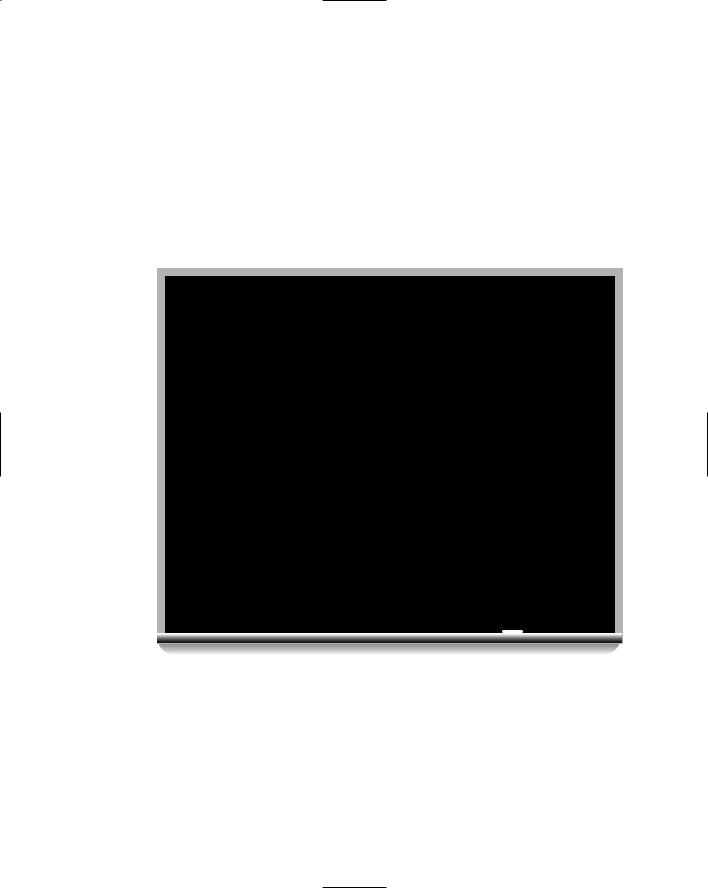
196 Part III: Arabic on the Go ____________________________________________
Adam: shukran. marHaba biki ‘ilaa maSraf al-’arab. shook-ran. mar-hah-bah bee-kee ee-lah mas-raf al-ah-rab.
Thank you. Welcome to Arab Bank.
Jennifer: shukran. shook-ran.
Thank you.
Words to Know
maa huwa |
mah hoo-wah |
what is (M) |
maa hiya |
mah hee-yah |
what is (F) |
mudiir al-maSraf |
moo-deer al-mas-raf |
bank manager (M) |
mudiira al-maSraf |
moo-dee-rah |
bank manager (F) |
|
al-mas-raf |
|
yawm |
yah-oom |
day |
shahr |
shah-her |
month |
sana |
sah-nah |
year |
mumarriDa |
moo-mah-ree-dah |
nurse (F) |
mustashfaa |
moos-tash-fah |
hospital |
nihaaya |
nee-hah-yah |
finish/ending |
al-‘i’timaad |
al-eeh-tee-mad |
credit |
Open season on the verb “to open”
You can’t open a Hisaab, or anything else for that matter, if you don’t know how to conjugate the verb fataHa (fah-tah-hah; opened) in both the maaDii (past) and the muDaari’ (present) forms. Here is the verb “to open” in the maaDii:
Form |
Pronunciation |
Translation |
‘anaa fataHtu |
ah-nah fah-tah-too |
I opened |
‘anta fataHta |
ahn-tah fah-tah-tah |
You opened (MS) |
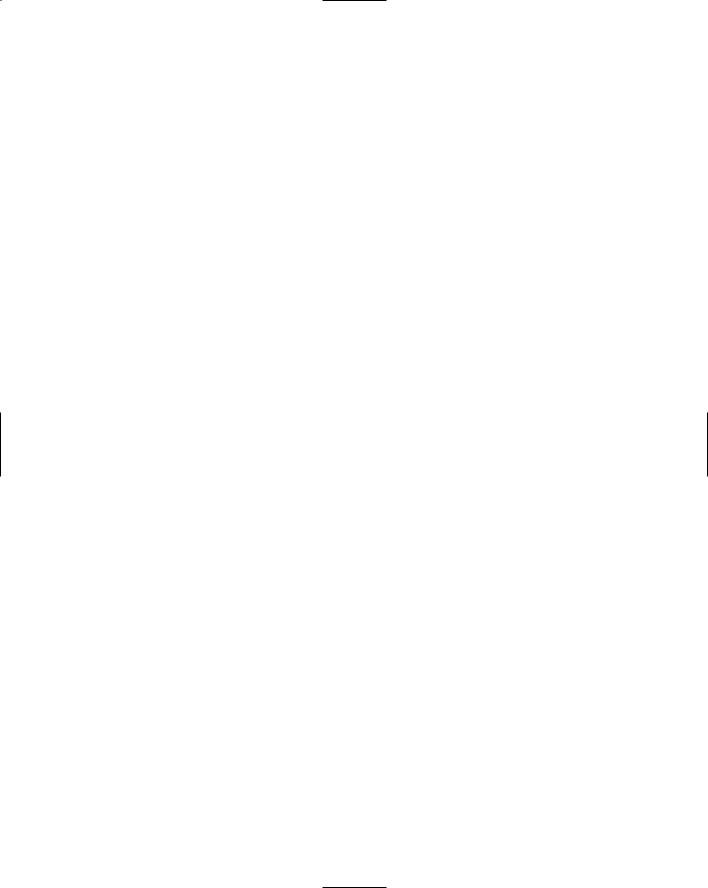
______________________________________ Chapter 11: Money, Money, Money 197
Form |
Pronunciation |
Translation |
‘anti fataHtii |
ahn-tee fah-tah-tee |
You opened (FS) |
huwa fataHa |
hoo-wah fah-tah-hah |
He opened |
hiya fataHat |
hee-yah fah-tah-hat |
She opened |
naHnu fataHnaa |
nah-noo fah-tah-nah |
We opened |
‘antum fataHtum |
ahn-toom fah-tah-toom |
You opened (MP) |
‘antunna fataHtunna |
ahn-too-nah fah-tah-too-nah |
You opened (FP) |
hum fataHuu |
hoom fah-tah-hoo |
They opened (MP) |
hunna fataHna |
hoo-nah fah-tah-nah |
They opened (FP) |
antumaa fataHtumaa |
ahn-too-mah fah-tah-too-mah |
You opened |
|
|
(dual/MP/FP) |
humaa fataHaa |
hoo-mah fah-tah-hah |
They opened |
|
|
(dual/MP) |
humaa fataHataa |
hoo-mah fah-tah-hah-tah |
They opened |
|
|
(dual/FP) |
To conjugate fataHa in the muDaari’, you use the form yaftaHu (yaf-tah-hoo):
Form |
Pronunciation |
Translation |
‘anaa ‘aftaHu |
ah-nah af-tah-hoo |
I am opening |
‘anta taftaHu |
ahn-tah taf-tah-hoo |
You are opening (MS) |
‘anti taftaHiina |
ahn-tee taf-tah-hee-nah |
You are opening (FS) |
huwa yaftaHu |
hoo-wah yaf-tah-hoo |
He is opening |
hiya taftaHu |
hee-yah taf-tah-hoo |
She is opening |
naHnu naftaHu |
nah-noo naf-tah-hoo |
We are opening |
‘antum taftaHuuna |
ahn-toom taf-tah-hoo-nah |
You are opening (MP) |
‘antunna taftaHna |
ahn-too-nah taf-tah-nah |
You are opening (FP) |
hum yaftaHuuna |
hoom yaf-tah-hoo-nah |
They are opening |
|
|
(MP) |
hunna yaftaHna |
hoo-nah yaf-tah-nah |
They are opening (FP) |
antumaa taftaHaani |
ahn-too-mah taf-tah-hah-nee |
You are opening |
|
|
(dual/MP/FP) |
humaa yaftaHaani |
hoo-mah yaf-tah-hah-nee |
They are opening |
|
|
(dual/MP) |
humaa taftaHaani |
hoo-mah taf-tah-hah-nee |
They are opening |
|
|
(dual/FP) |
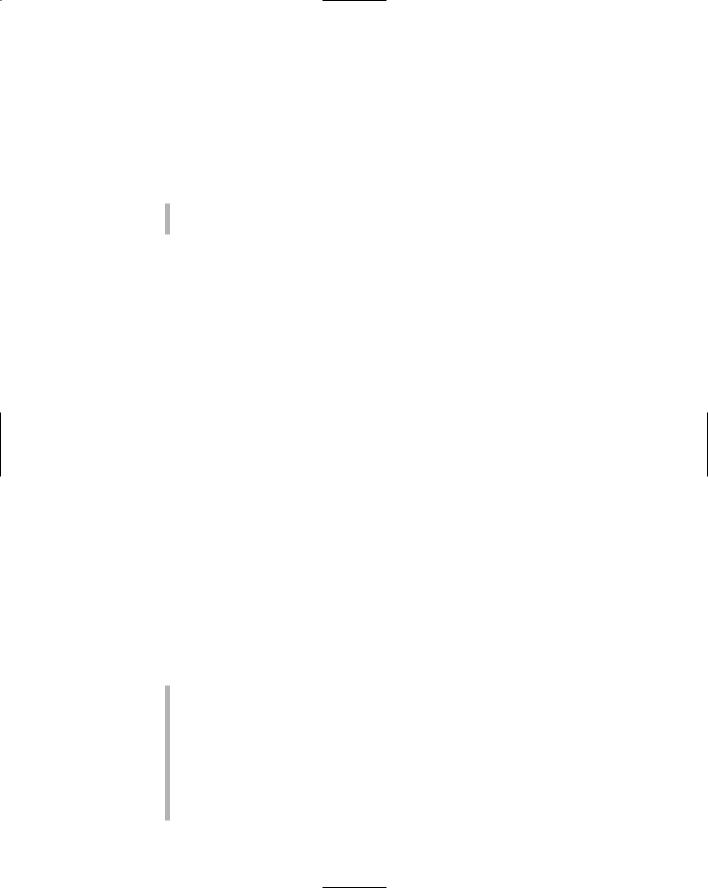
198 Part III: Arabic on the Go ____________________________________________
Making deposits and withdrawals
After you open your Hisaab, the two most basic transactions you’ll probably make are:
wadii’a (wah-dee-ah; deposit)
‘insiHaab (een-see-hab; withdrawal)
To make a wadii’a, you may deposit into your Hisaab maSrafii (bank account) using a shiik (check) or fuluus (cash). You may go to the ‘amiin al-maSraf to make the wadii’a or do it yourself at an ATM, if your bank allows that.
Similarly, you may perform a ‘insiHaab by either going to the ‘amiin al-maSraf or by using the ATM.
Using the ATM
In recent years, the number of ATMs located around the world has mushroomed, and in places like New York City, you can’t walk half a block without spotting one. Whether you’re in the United States, the Middle East, or other countries or regions of the world, there’s a good chance that you’ll use an ATM to withdraw fuluus. This section covers the terminology you encounter at an ATM to help make this a smooth and efficient transaction.
Most ATMs accept all sorts of cards, whether they’re issued by the same maSraf that operates the ATM terminal or not. However, some ATMs charge you a ‘ujra (ooj-rah; fee) if you use a card not issued by a recognized maSraf. In addition, most ATMs accept both biTaaqaat al-‘i’timaad (credit cards) and biTaaqaat al-‘istilaaf (debit cards). Note: Another word for “credit card” is biTaaqa diiniiya (bee-tah-kah dee-nee-yah).
Although most ATMs let you choose the language you want to conduct your transaction in, you should still be aware of ATM-related commands and phrases in Arabic:
‘udkhul al-biTaaqa (ood-kool al-bee-tah-kah; Insert the card.)
‘udkhul ar-raqm as-siriiy. (ood-kool ah-rah-kem ah-see-ree; Enter the PIN/secret number.)
‘insiHaab al-fuluus (een-see-hab al-foo-loos; cash withdrawal)
‘udkhul al-kammiyya. (ood-kool al-kah-mee-yah; Enter the amount.)
‘akkid al-kammiyya. (ah-keed al-kah-mee-yah; Confirm the amount.)
khudh al-fuluus. (kooz al-foo-loos; Take the cash.)
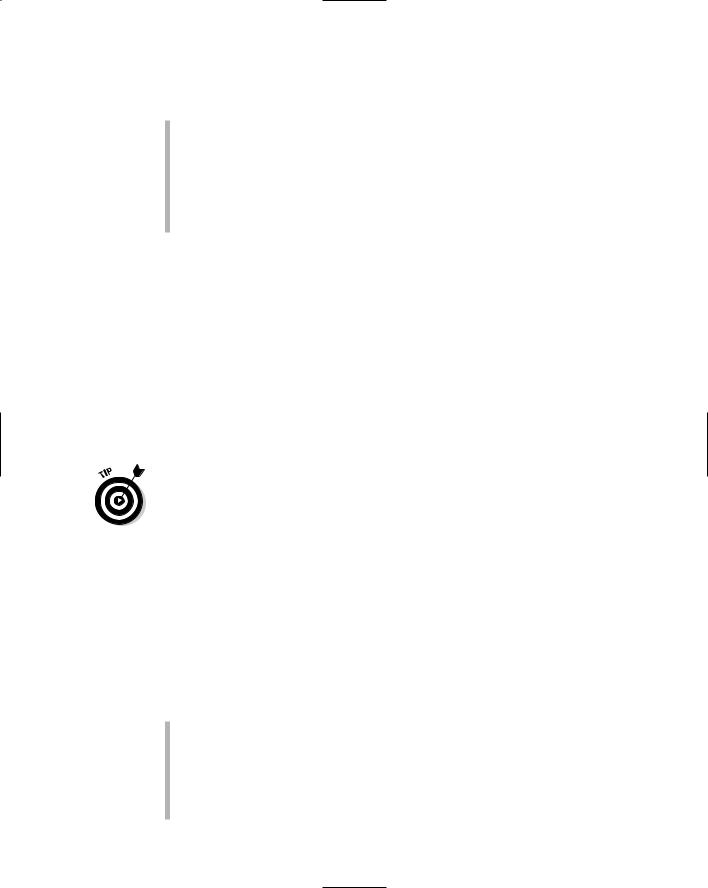
______________________________________ Chapter 11: Money, Money, Money 199
hal turiidu ‘iiSaala? (hal too-ree-doo ee-sah-lah; Do you want a receipt?)
khudh al-‘iiSaala. (kooz al-ee-sah-lah; Take the receipt.)
Haqqiq ar-raSiid. (hah-keek ah-rah-seed; Check the balance.)
Hawwil al-amwaal. (hah-weel al-am-wal; Transfer the money.)
‘azil al-biTaaqa min faDlik. (ah-zeel al-bee-tah-kah meen fad-leek; Please remove the card.)
Exchanging Currency
If you’re traveling to a foreign dawla (dah-ou-lah; country), you won’t get very far if you don’t have the right ‘umla mutadaawala (oom-lah moo-tah-dah-wah- lah; currency), or ‘umla (oom-lah) for short. (Of course, you could rely on shiikat al-musaafir (shee-kat al-moo-sah-feer; traveler’s checks), but you may find that carrying ‘umla is more convenient.) You can exchange ‘umla at a number of different places. If you like to plan in advance, then stopping by the maSraf before your safar (sah-far; trip) is a good idea. Otherwise, you can go to a maktab as-sarf (mak-tab ah-sah-ref; exchange desk) located at the maTaar (mah-tar; airport).
You’re likely to get better exchange rates in your home country at your local bank than at an airport in a foreign country. If you’re visiting a foreign country and need to change money, then the best way for you to exchange currencies is to go to a reputable bank of international renown and make your transactions there.
Getting to know the currencies around the world
In order to exchange your money, you need to be familiar with the different types of currencies you’re dealing with. The following lists feature some of the most common currencies grouped by specific regions around the world.
The following currencies are used in the Middle East:
Algeria: diinaar jazaa’irii (dee-nar jah-zah-ee-ree; Algerian dinar)
Bahrain: diinaar baHrainii (dee-nar bah-ray-nee; Bahraini dinar)
Egypt: junya maSriiyya (joon-yah mas-ree-yah; Egyptian pound)
Iraq: diinaar ‘iraaqii (dee-nar ee-rah-kee; Iraqi dinar)
Jordan: diinaar ‘urduniiy (dee-nar oor-doo-nee; Jordanian dinar)
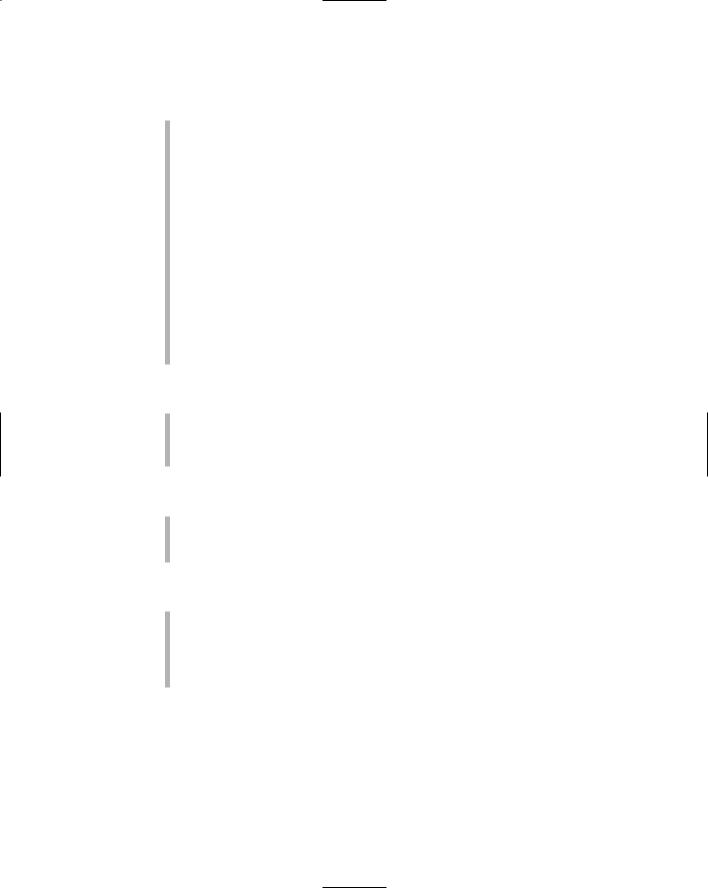
200 Part III: Arabic on the Go ____________________________________________
Kuwait: diinaar kwaytii (dee-nar kuh-way-tee; Kuwaiti dinar)
Lebanon: liira lubnaaniiya (lee-rah loob-nah-nee-yah; Lebanese pound)
Libya: diinaar liibii (dee-nar lee-bee; Libyan dinar)
Morocco: dirham maghribii (deer-ham mag-ree-bee; Moroccan dirham)
Oman: riyaal ‘ummaanii (ree-yal oh-mah-nee; Omani dinar)
Qatar: riyaal qaTarii (ree-yal kah-tah-ree; Qatari riyal)
Saudi Arabia: riyaal sa’uudii (ree-yal sah-oo-dee; Saudi riyal)
Syria: liira suuriiya (lee-rah soo-ree-yah; Syrian pound)
Tunisia: diinaar tunsii (dee-nar toon-see; Tunisian dinar)
United Arab Emirates (UAE): dirham al-‘imaaraat (deer-ham al-ee-mah- rat; Emirate dirham)
Yemen: riyaal yamanii (ree-yal yah-mah-nee; Yemeni riyal)
In North America, you find the following currencies:
Canada: duulaar kanadiiy (doo-lar kah-nah-dee; Canadian dollar)
Mexico: biisoo miksiikiiy (beh-soo meek-see-kee; Mexican peso)
USA: duulaar ‘amriikiiy (doo-lar am-ree-kee; American dollar)
Only two currencies are used in Europe:
European Union (EU): al-yooro (al-yoo-roh; euro)
United Kingdom: junya briiTaaniiyya (joon-yah bree-tah-nee-yah; British pound)
The following currencies are used in Asia:
Australia: duulaar ‘oosTraliiy (doo-lar oos-trah-lee; Australian dollar)
China: yooan Siiniiy (yoo-an see-nee; Chinese yuan)
Japan: yen yabanii (yen yah-bah-nee; Japanese yen)
South Korea: won al-koorii (won al-koo-ree; Korean won)
Making exchanges
Knowing the names of the currencies is only the first step toward exchanging the currency you hold into the one you need. The following list of questions can help you facilitate this exchange at the maSraf:
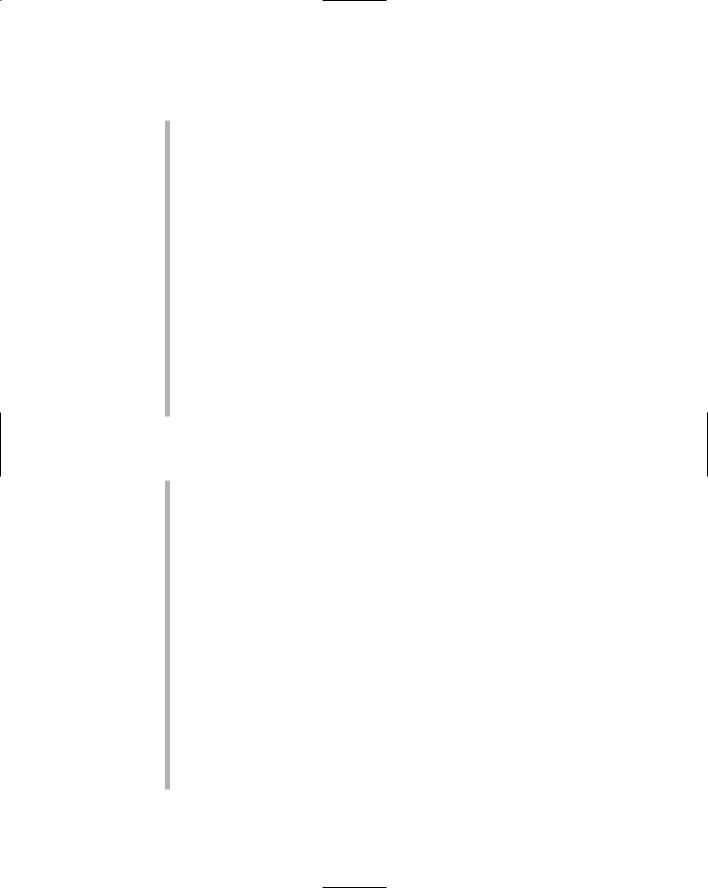
______________________________________ Chapter 11: Money, Money, Money 201
‘ayna maktab as-sarf? (ay-nah mak-tab ah-sah-ref; Where is the exchange desk?)
hal maktab as-sarf qariib min hunaa? (hal mak-tab ah-sah-ref kah-reeb meen hoo-nah; Is the exchange desk close to here?)
mataa yaHull maktab as-sarf? (mah-tah yah-hool mak-tab ah-sah-ref;
When does the exchange desk open?)
maa huwa mu’addal as-sarf al-yawm? (mah hoo-wah moo-ah-dal ah-sah- ref al-yah-oum; What is today’s exchange rate?)
hal mu’addal as-sarf sayakuun ‘aHsan ghadan? (hal moo-ah-dal ah-sah-ref sah-yah-koon ah-san gah-dan; Will the exchange rate be better tomorrow?)
hal hunaaka ‘ujra li tasriif al-fuluus? (hal hoo-nah-kah ooj-rah lee tas-reef al-foo-loos; Is there a fee for exchanging money?)
‘uriidu ‘an ‘aSrifa duularaat ‘ilaa daraahim. (oo-ree-doo an as-ree-fah doo-lah-rat ee-lah dah-rah-heem; I would like to exchange dollars into dirhams.)
kam min diinaar li mi’at duulaar? (kam meen dee-nar lee mee-at doo-lar;
How many dinars for one hundred dollars?)
Here are some answers you may hear from the ‘amiin maktab as-sarf (ahmeen mak-tab ah-sah-ref; exchange desk representative):
maktab as-sarf yaHull ma’a as-saa’a ath-thaamina fii aS-SabaaH. (maktab ah-sah-ref yah-hool mah-ah ah-sah-ah ah-thah-mee-nah fee ah-sah-bah;
The exchange desk opens at 8:00 in the morning.)
na’am, nusarrif duulaaraat ‘ilaa daraahim. (nah-am, noo-sah-reef doo- lah-rat ee-lah dah-rah-heem; Yes, we exchange dollars into dirhams.)
mu’addal as-sarf al-yawm mithla mu’addal as-sarf al-‘ams. (moo-ah-dal ah-sah-ref al-yah-oum meet-lah moo-ah-dal ah-sah-ref al-ah-mes; Today’s exchange rate is the same as yesterday’s exchange rate.)
naHnu naqbal duulaaraat faqat. (nah-noo nak-bal doo-lah-rat fah-kat; We only accept dollars.)
naHnu naqbal nuquud faqat. (nah-noo nak-bal noo-kood fah-kat; We only accept cash.)
mi’at duulaar tusaawii ‘alf riyaal. (mee-at doo-lar too-sah-wee ah-lef reeyal; One hundred dollars equals one thousand riyals.)
hunaaka ‘ujra ‘ashrat duulaar li kul maHDar. (hoo-nah-kah ooj-ra ash-rat doo-lar lee kool mah-dar; There is a ten dollar fee for every transaction.)
maktab as-sarf daakhil al-maSraf. (mak-tab ah-sah-ref dah-keel al-mas-raf;
The exchange desk is inside the bank.)
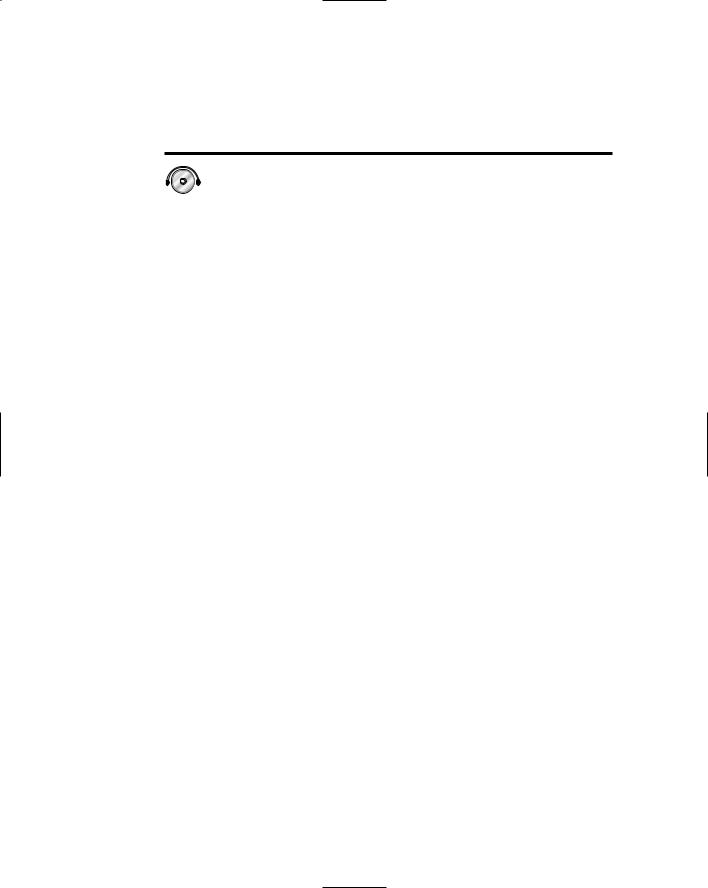
202 Part III: Arabic on the Go ____________________________________________
Talkin’ the Talk
Sam stops by a currency exchange desk to exchange dollars into dirhams. The exchange desk teller helps him with this transaction.
Sam: hal yumkin ‘an tusrifa duulaaraat ‘ilaa daraahim? hal yoom-keen an toos-ree-fah doo-lah-rat ee-lah dah-rah-heem?
Is it possible for you to exchange dollars into dirhams?
Teller: Tab’an. tah-bah-an.
Of course.
Sam: Tayyib. ‘uriidu ‘an ‘asrifa ‘alf duulaar ‘ilaa daraahim. tah-yeeb. oo-ree-doo an as-ree-fah ah-lef doo-lar ee-lah dah-rah-heem.
Good. I would like to exchange one thousand dollars into dirhams.
Teller: raa’i’. yumkin ‘an ‘usaa’iduka.
rah-eeh. yoom-keen an oo-sah-ee-doo-kah.
Great. I’ll be able to help you with that.
Sam: ‘awwalan, hal yumkin ‘an taquula li maa huwa mu’addal as-sarf al-yawm?
ah-wah-lan, hal yoom-keen an tah-koo-lah lee mah hoo-wah moo-ah-dal ah-sah-ref al-yah-oum?
First, can you tell me today’s exchange rate?
Teller: mu’addal as-sarf al-yawm ‘anna kulla duulaar yusaawii ‘ashrat daraahim.
moo-ah-dal ah-sah-ref al-yah-oum ah-nah koo-lah doo-lar yoo-sah-wee ash-rat dah-rah-heem.
Today’s exchange rate is one dollar equals ten dirhams.
Sam: ‘idhan ‘alf duulaar tusaawii ‘ashrat ‘alaaf daraahim? ee-zan ah-lef doo-lar too-sah-wee ash-rat ah-laf dah-rah-heem?
Therefore one thousand dollars equals ten thousand dirhams?
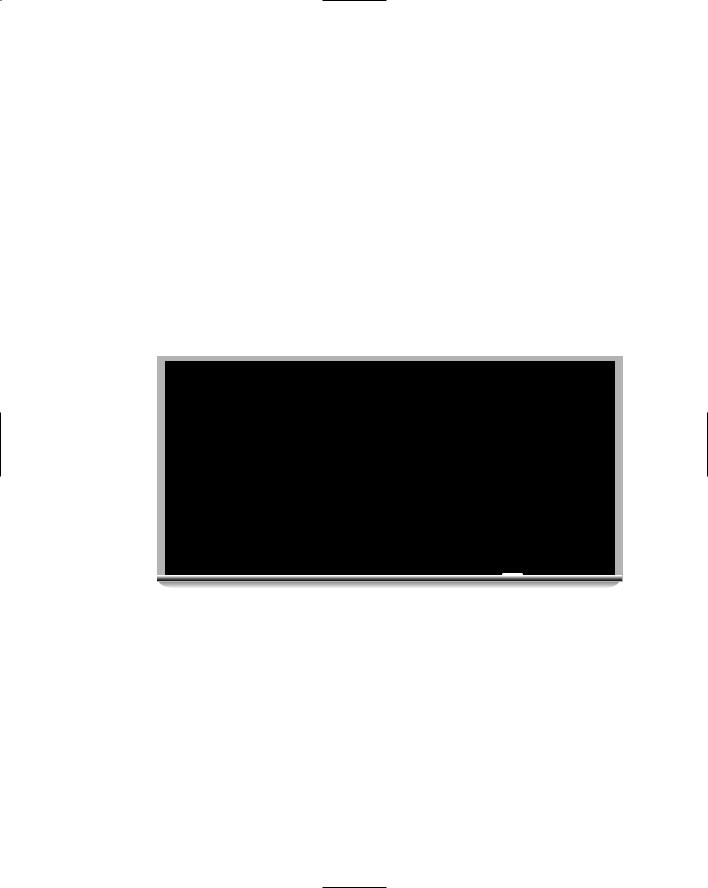
______________________________________ Chapter 11: Money, Money, Money 203
Teller: SaHH. sah.
That’s correct.
Sam: Tayyib. ‘israf li min faDlik ‘alf duulaar ‘ilaa ‘ashrat
‘alaaf daraahim.
tah-yeeb. ees-raf lee meen fad-leek ah-lef doo-lar ee-lah ash-rat ah-laf dah-rah-heem.
Good. Please exchange one thousand dollars into ten thousand dirhams.
Teller: fawran. faw-ran.
Right away.
Words to Know
tusrifa |
toos-ree-fah |
to exchange (M) |
tusrifiina |
toos-ree-fee-nah |
to exchange (F) |
‘alf |
ah-lef |
thousand |
yusaawii |
yoo-sah-wee |
equals (M) |
tusaawii |
too-sah-wee |
equals (F) |
SaHiiH |
sah-heeh |
correct |
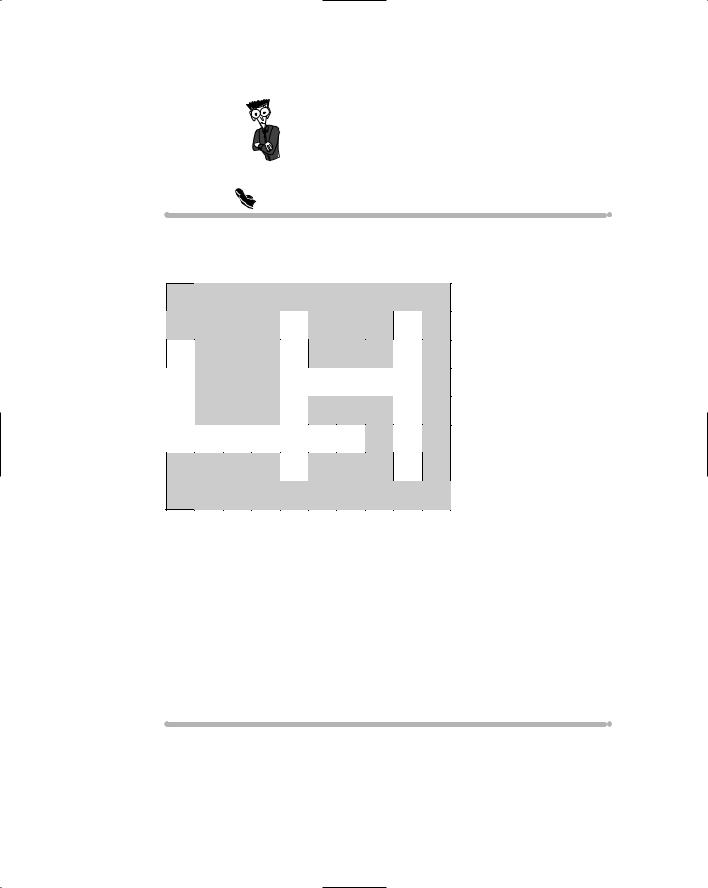
204 Part III: Arabic on the Go ____________________________________________
 Fun & Games
Fun & Games
Use the clues below to fill in the words in this Arabic crossword puzzle.
1. |
3. |
2. |
|
2. |
1. |
Across
1.dollar
2.check
Down
1.bank
2.coin
3.desk
The answers to this puzzle appear in Appendix C.
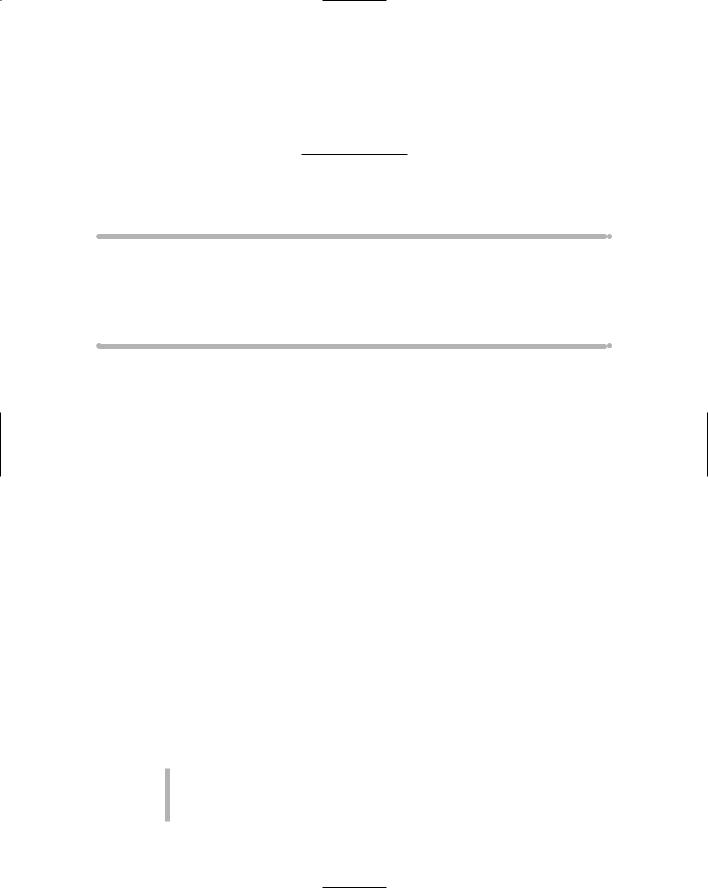
Chapter 12
Asking for Directions
In This Chapter
Asking and answering “where” questions
Clarifying directions
Exploring ordinal numbers
Being able to ask for — and understand — ‘ittijaahaat (ee-tee-jah-hat; directions) is an important skill, particularly if you’re traveling in an Arabic-speaking country. In order to interact with and get assistance from
native Arabic speakers, you need to know how to ask questions that will help you get where you want to be. And you also need to understand the ‘ittijaahaat that are being given to you!
In this chapter, I tell you how to interact with native speakers in order to get relevant information to help you find what you’re looking for!
Focusing on the “Where”
In order to ask for and give directions, you need to be able to answer and ask “where” questions. In this section, I tell you how to do just that.
Asking “where” questions
The best way to get directions-related information from Arabic speakers is to ask ‘ayna (eh-yeh-nah; where) questions. Luckily, the structure of an ‘ayna question is relatively straightforward: You use ‘ayna followed by the subject. For example:
‘ayna al-funduq? (eh-yeh-nah al-foon-dook; Where is the hotel?)
‘ayna al-haatif? (eh-yeh-nah al-haa-teef; Where is the phone?)
‘ayna al-mirHaaD? (eh-yeh-nah al-meer-haad; Where is the bathroom?)
